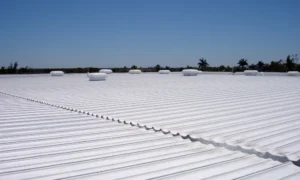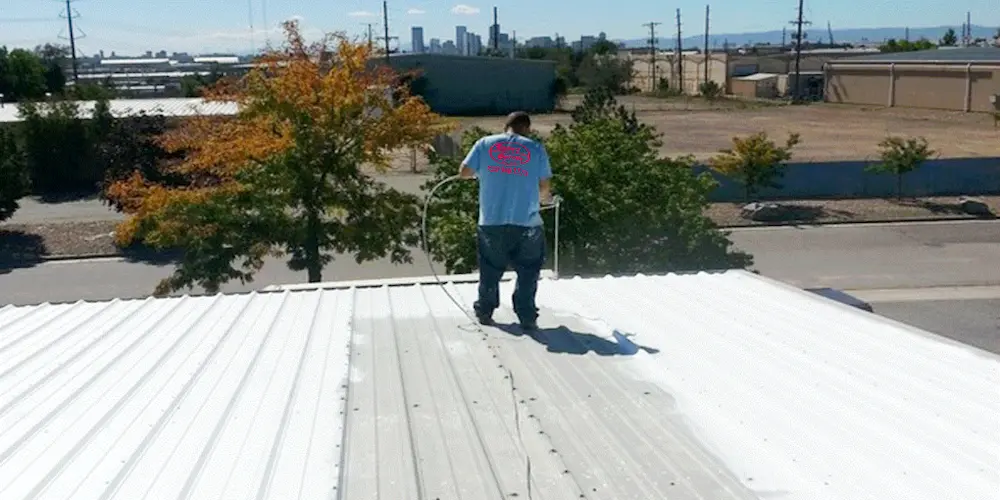Commercial Roof Coating Showdown: Silicone vs Acrylic
Learn about the key differences between silicone and acrylic roof coatings for commercial and industrial buildings. Discover which coating is best for extending the life of your roof, enhancing energy efficiency, and providing superior waterproofing and protection. Presented by Ernie’s Roofing, your trusted roofing contractor in Denver since 1978.
Hey there, fellow roofing enthusiasts! 👷♂️ Welcome back to Ernie’s Roofing blog, where we’re always ready to share some insightful tips and tricks to help you make the best decisions for your commercial or industrial roofing needs. Today, we’re diving deep into the world of commercial roof coatings, focusing on the battle between silicone and acrylic sealants.
As a third-generation roofing contractor with decades of experience under our belts, we’ve seen firsthand how crucial it is to choose the right protective coating for your roof. Whether you’re looking to enhance energy efficiency, extend the life of your roof, or simply provide top-notch waterproofing, understanding the differences between silicone and acrylic coatings is key. So, let’s roll up our sleeves and get started!
___________________________________________________________________________________________________
Understanding the Basics
Before we delve into the nitty-gritty details, let’s lay down some groundwork on what commercial roof coatings are all about.
Commercial Roof Coating: A specialized protective sealant applied to commercial and industrial roofs to enhance durability, waterproofing, and energy efficiency.
Silicone vs Acrylic: The Showdown Begins
Now, let’s get down to business and explore the key differences between silicone and acrylic roof coatings.
1. Chemical Composition
- Silicone: Made from silica and pliable materials, offering superior flexibility.
- Acrylic: Water-based and prone to chalking over time.
2. Cost
- Acrylic: Generally more affordable upfront.
- Silicone: Offers better long-term value due to its durability and longevity.
3. Longevity and Durability
- Silicone: Non-sacrificial, handles ponding water better, and boasts superior UV stability.
- Acrylic: Prone to chalking and may deteriorate faster, especially in areas with ponding water.
4. Reflectivity
- Acrylic: Maintains reflectivity better over time due to its sacrificial nature.
- Silicone: Stays cleaner and retains reflectivity initially but may degrade over time.
5. Resistance to Ponding
- Silicone: Waterproof and ideal for areas with ponding water.
- Acrylic: May deteriorate when exposed to prolonged ponding.
6. Application Method
- Silicone: Requires specialized equipment and expertise, making it more expensive to install.
- Acrylic: Easier to apply and more cost-effective in terms of installation.
7. Environmental Friendliness
- Both silicone and acrylic are considered environmentally friendly, with acrylic having the edge due to its water-based nature.
FAQs: Your Burning Questions Answered
Now, let’s address some common questions that might be on your mind:
1. Which roof coating is better for energy efficiency?
Silicone and acrylic coatings both offer energy-saving benefits, but acrylic tends to maintain reflectivity better over time, enhancing energy efficiency in the long run.
2. Can silicone coatings handle ponding water?
Yes, silicone coatings are waterproof and excel in areas with ponding water, making them an ideal choice for flat roofs or areas prone to water buildup.
3. Are acrylic coatings more budget-friendly?
Yes, acrylic coatings are generally more affordable upfront, making them a popular choice for budget-conscious property owners.
4. How long do silicone roof coatings last?
Silicone roof coatings can last anywhere from 5 to 30 years, depending on the specific manufacturer and maintenance practices.
5. Do acrylic coatings require specialized equipment for application?
No, acrylic coatings are easier to apply and can be installed using standard equipment, reducing installation costs and time.
6. Which roof coating is more environmentally friendly?
Both silicone and acrylic coatings are considered environmentally friendly, but acrylic has the edge due to its water-based composition.
7. Can silicone coatings withstand UV exposure?
Yes, silicone coatings offer superior UV stability compared to acrylic coatings, providing long-lasting protection against sun damage.
8. Are silicone coatings prone to chalking?
No, silicone coatings are non-sacrificial and do not chalk over time, maintaining their integrity and appearance for longer periods.
9. Do acrylic coatings require frequent maintenance?
Acrylic coatings may require more frequent maintenance due to their sacrificial nature and tendency to degrade over time, especially in harsh weather conditions.
10. Which roof coating is best for extending the life of my roof?
Silicone coatings are generally preferred for extending the life of commercial roofs due to their durability, longevity, and superior waterproofing capabilities.
Wrapping Up
And there you have it, folks! A comprehensive guide to choosing the right commercial roof coating for your property. Whether you opt for silicone or acrylic, the key is to consider factors like cost, longevity, durability, and environmental impact to make an informed decision. Need further assistance or advice? Don’t hesitate to reach out to the experts at Ernie’s Roofing – we’re here to help!
Until next time, happy roofing! 🏠✨
Ernie’s Roofing
Since 1978
Denver, CO
720 346 ROOF or info@erniesroofing.com Visit our website

